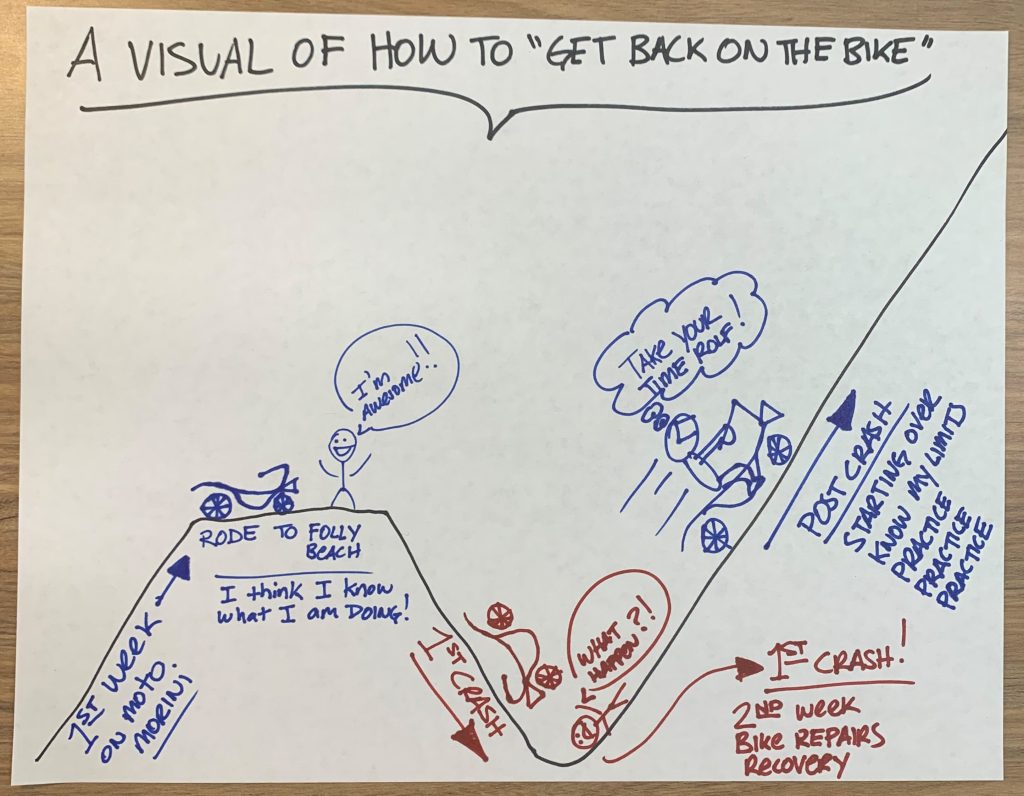It WILL happen to you if you ride a motorcycle….a crash. And, if you are like me, a beginner, your first crash on your new bike might turn you off from the art of motorcycling, or, encourage you to learn, understand, and be MORE committed to riding your motorcycle.
I will admit. I did not believe I would crash practicing the art of motorcycling. Yes. I am that arrogant LOL. Plus, my short, brief experience as a motorcyclist suggested, no, I would never drop my bike. And no way will I ever crash! I am an idiot for not truly understanding the learning process when practicing the art of motorcycling. So, let’s take a brief tour of my history with motorcycling to paint a picture of how STUPID I was. During my Basic Rider Course at Trident Technical College, I did not once drop or crash my training bike. “I am a pro”, I thought. Then, I purchased my new bike, and the first week was amazing. Highlighted above with my info graphic, that I rode to Folly Beach at sunset and thought, “I am amazing!”. To boost my confidence I rode twice the same week as my Folly Beach ride during Tropical Storm Debby, and really believed I had the chops to have a perfect riding record for the next 5 to 10 years.
Then, week two on my new Moto Morini Seiemmezzo SCR started on a beautiful, hot and humid Sunday afternoon. I knew my route. I was going to train at the parking lot next to Camp Road Middle School and start week two with a bang. Quickly, things went south. I made a left turn into the parking lot, rolled the throttle, and immediately recognized I was approaching the curb too fast and too wide. Panic set in. I forgot all my training, two weeks worth LOL, and slammed into the curb going about 10 miles an hour. After I got control of my emotions, I lifted my bike up, slapped the kick stand down, and walked for a brief period. I didn’t want to look at the damage I had done to my new bike. Was it totaled? Did I just lose $7 thousand in less than a second? And most importantly, how will I get home?
I honest believe now, after my first crash, that it was a wake up call. I must practice, practice, practice. Yes, riding to Folly Road at 50 mph is awesome! But do I know how to handle myself at that speed and survive? And will I get back on my bike and ride again? I am happy to say, three days later, after some recovery, documenting my mistakes before the crash, getting back on my Moto Morini, and limiting my practice route is bringing me a new found respect for the art of motorcycling. In short, I will repair my bike. I am VERY happy I invested in gear from head to toe, and will get back to basics of motorcycling (slow speed maneuvers, stopping, turning left and right, engine braking and more). I have decide to short my time on the bike from 3 hours rides, to 1.5 hours or less with strict focus on the basics. Thus, I will shorten recovery time and most importantly, no back to back days of riding. At this time in my motorcycling career, I am learning SO MUCH that I must allow my brain and body to rest between riding days. Sure, my first crash hurt. Physically, and mentally. But riding just 10 miles, on a cool Wednesday afternoon, sticking only to residential neighborhoods on James Island, locking in on specific trainings for newbies, I feel I am once again climbing uphill to a new level in the art of motorcycling that will be even more rewarding than before.
Stay safe all you motorcyclists!
Rolf

Thanks for the great resource.
I love how you’ve broken down this topic into easy-to-understand sections. The step-by-step approach you’ve taken is very helpful.